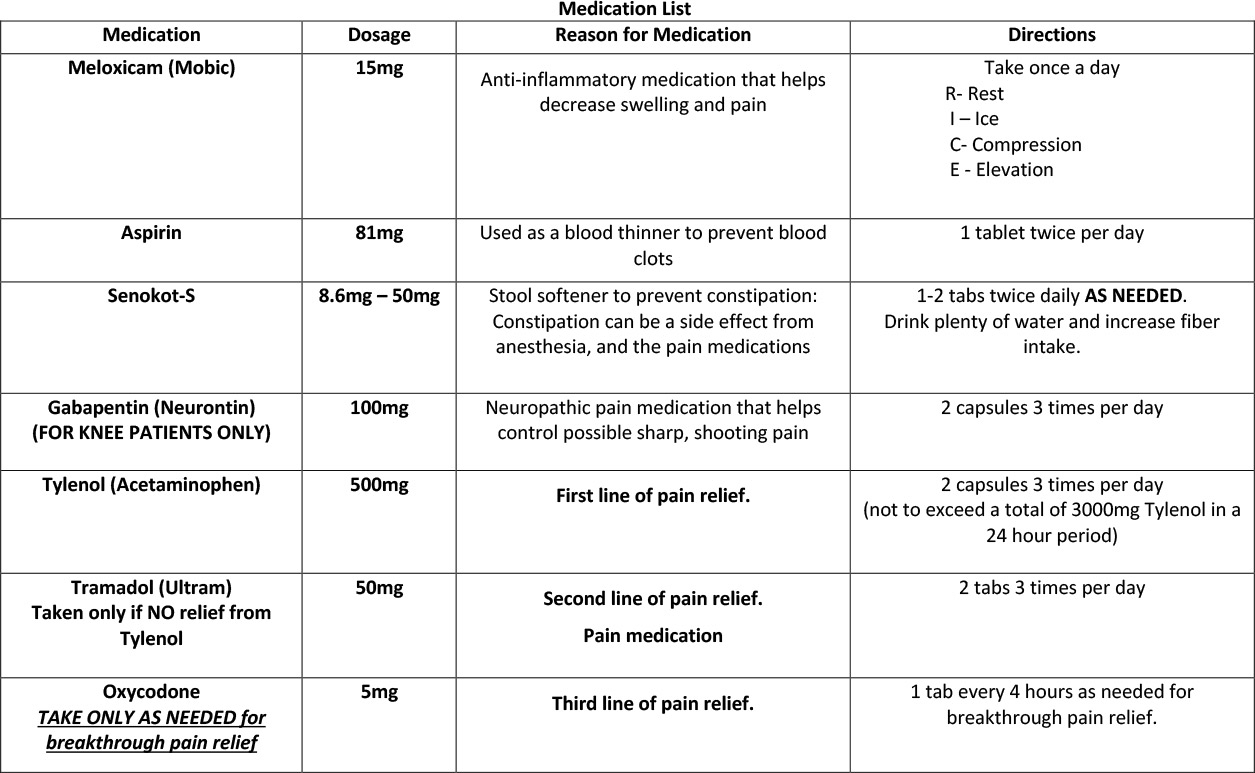Postop Care FAQ
Have a question about a specific hip or knee surgery? Visit our patient education section for information and answers to common questions about hip and knee procedures.
Postop Care Questions
- How do I care for my dressing after surgery? Can I shower after surgery?
- What if I have a question after surgery, whom should I call?
- What if I have a question on the weekend or at night?
- Can I shower after surgery?
- Will I have sutures or staples used to close the skin that need to be removed after surgery?
- Should I go to the emergency room if I have a problem?
- How active should I be after surgery?
- When Can I Drive After Surgery?
- How Do I Take The Pain Medicine After Surgery?
Will I have sutures or staples used to close the skin that need to be removed after surgery?
Dr. Della Valle prefers to use a “plastic surgery” layered wound closure with sutures underneath the skin. In our experience this leads to a better looking incision, but one that also heals more quickly and avoids the pain associated with staple or suture removal.
How do I care for my dressing after surgery? Can I shower after surgery?
At the time of surgery, a waterproof bandage will be placed on your incision and you can shower right after surgery. This special bandage has been shown to decrease the risk of wound healing problems and infection after surgery by providing an optimal environment for wound healing. If you have leakage from around the bandage or you (or anyone else) has questions or concerns about the dressing or your wound, please call our office immediately.
This dressing stays in place for one week and then must be changed. You can purchase a replacement dressing for the second week after surgery in our Durable Medical Equipment store. We recommend purchasing this either on the day of your teaching class or to have a family member or friend get one for you before you leave the hospital. Just let the people at the store know you are my patient and they will help you pick out the right bandage.
If you do not purchase this bandage, a dry dressing can be placed over the incision for one more week, however you cannot get it wet.
At two weeks after surgery, you can leave the incision open to air and you can shower, but not submerge the incision. The incision can be submerged in a pool or bath at approximately 3-4 weeks after surgery, once it is fully healed with no scabbing present.
What if I have a question after surgery, whom should I call?
We have two nurses and two administrative assistants who are available to help you before and after surgery to answer any of your questions or concerns. Ideally, we recommend that you call us at 708-236-2738 during normal business hours to have your questions answered by someone who knows Dr. Della Valle’s protocols and knows you as a patient! While other care providers are available 24hours per day and 7 days per week, we again strongly recommend calling us during normal business hours.
What if I have a question on the weekend or at night?
There is always a resident of fellow available to answer your calls, however they may not know your case personally and hence we recommend trying to reach us during normal business hours if you can.
Can I shower after surgery?
At the time of surgery, a waterproof bandage will be placed on your incision and you can shower right after surgery. This special bandage has been shown to decrease the risk of wound healing problems and infection after surgery by providing an optimal environment for wound healing.
This dressing stays in place for one week and then must be changed. You can purchase a replacement dressing for the second week after surgery in our Durable Medical Equipment store. We recommend purchasing this either on the day of your teaching class or to have a family member or friend get one for you before you leave the hospital. Just let the people at the store know you are my patient and they will help you pick out the right bandage.
If you do not purchase this bandage, a dry dressing can be placed over the incision for one more week, however you cannot get it wet.
At two weeks after surgery, you can leave the incision open to air and you can shower, but not submerge the incision. The incision can be submerged in a pool or bath at approximately 3-4 weeks after surgery, once it is fully healed with no scabbing present.
Should I go to the emergency room if I have a problem?
In general, we strongly recommend against going to the emergency room unless you feel you have a true emergency. In general, the emergency room staff will not know you and may not be familiar with patients who have had a hip or knee replacement. Hence, we strongly recommend trying to contact us with any problems during normal business hours so we can see you if you are having any problems or if you have any questions or concerns.
If you do have to go to an emergency room, we strongly prefer you come back to RUSH where there will be a resident on call who can evaluate you and discuss your care with me.
How active should I be after surgery?
Following hip replacement surgery, we prefer that patients limit their activity to their required activities of daily living particularly for the first few days after surgery. The implants that we put in are “press-fit” into the bone and the bone will actually grow into the implants over time. We think that process takes about six weeks and hence we discourage any type of vigorous activity for the first six weeks. There is also soft tissue healing that has to occur early after surgery.
When Can I Drive After Surgery?
The earliest that we recommend driving is three weeks postoperatively if you feel it is safe. You should not be taking opioid pain medication while driving. We suggest going to a parking lot and trying things out first before hitting the road for the first time.
How Do I Take The Pain Medicine After Surgery?
Click on the table below to enlarge it.
Have a question about a specific hip or knee surgery? Visit our patient education section for information and answers to common questions about hip and knee procedures.








